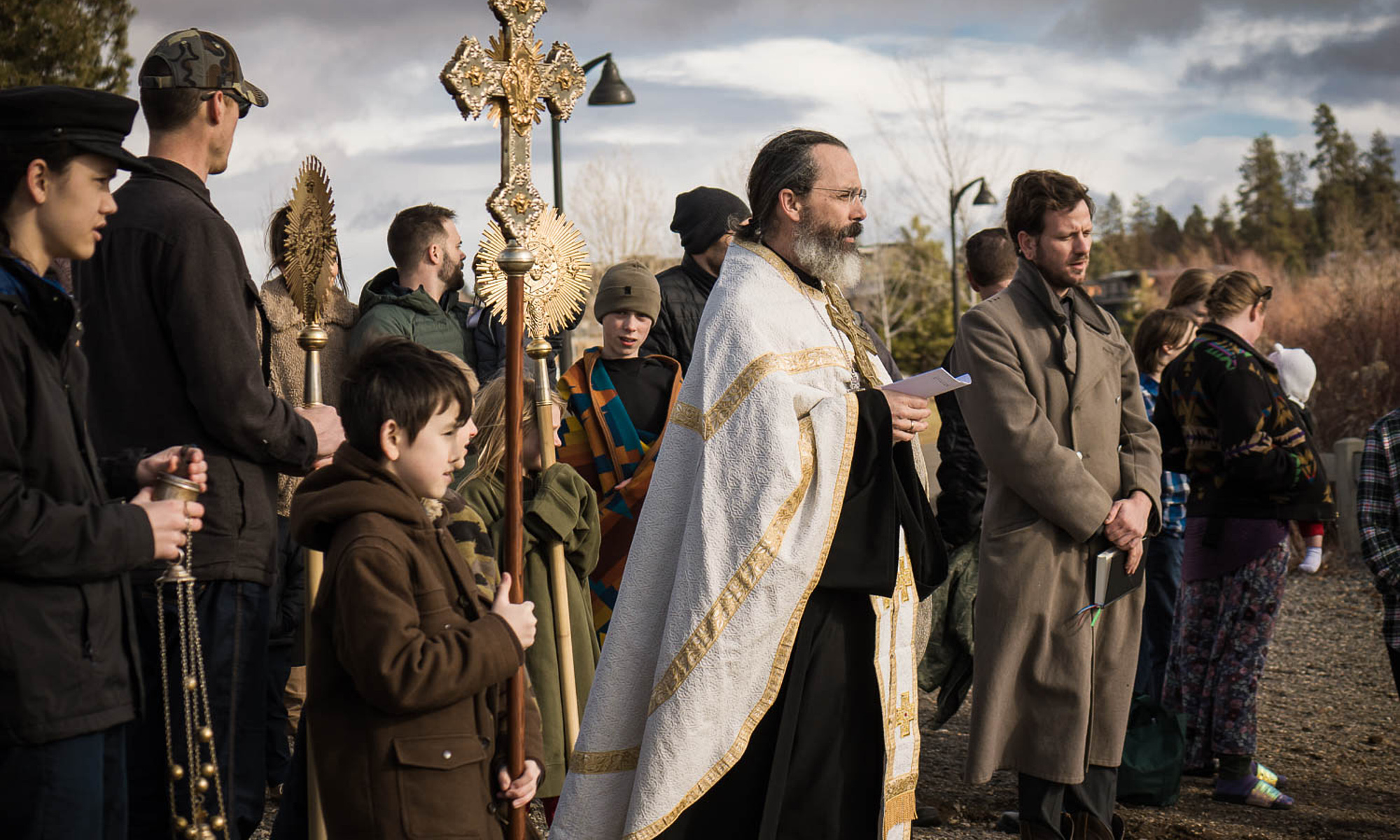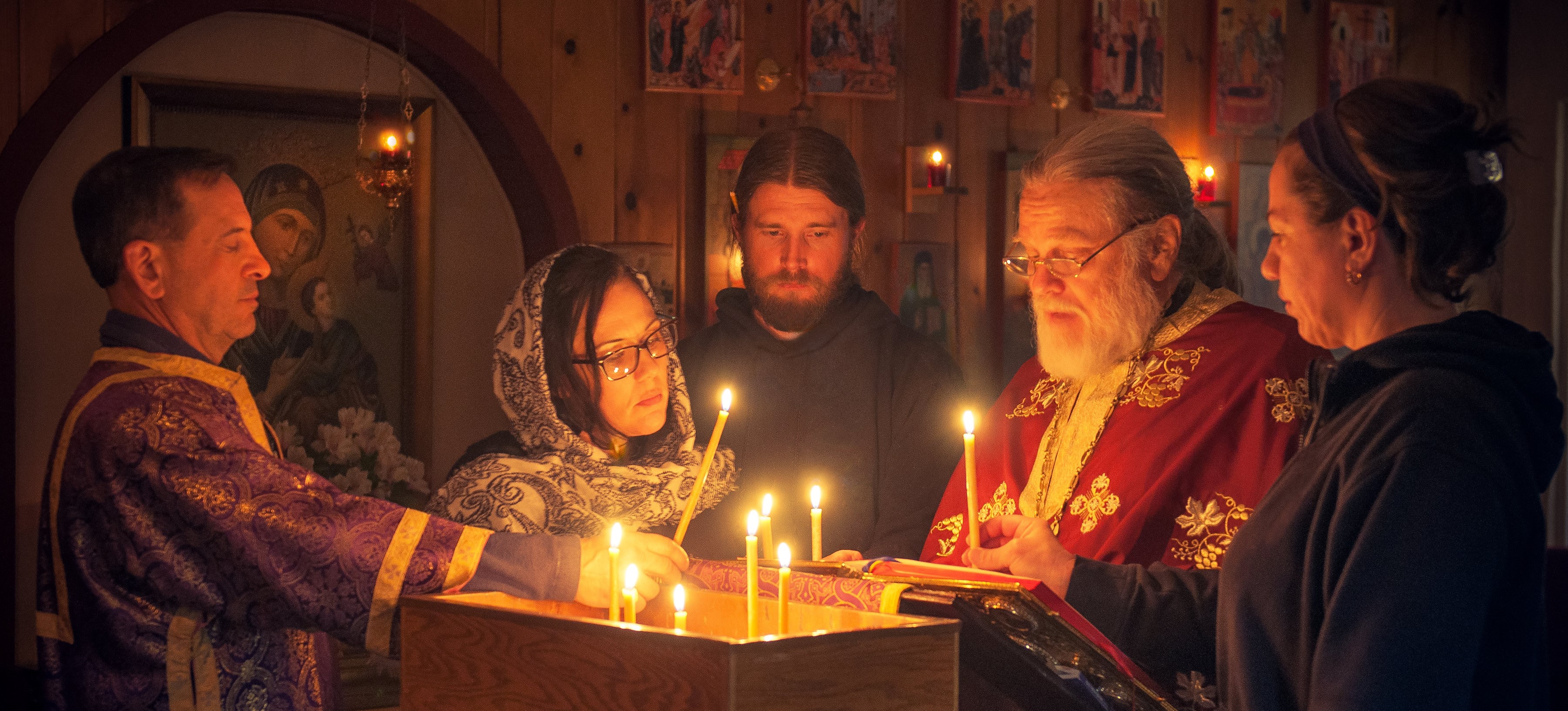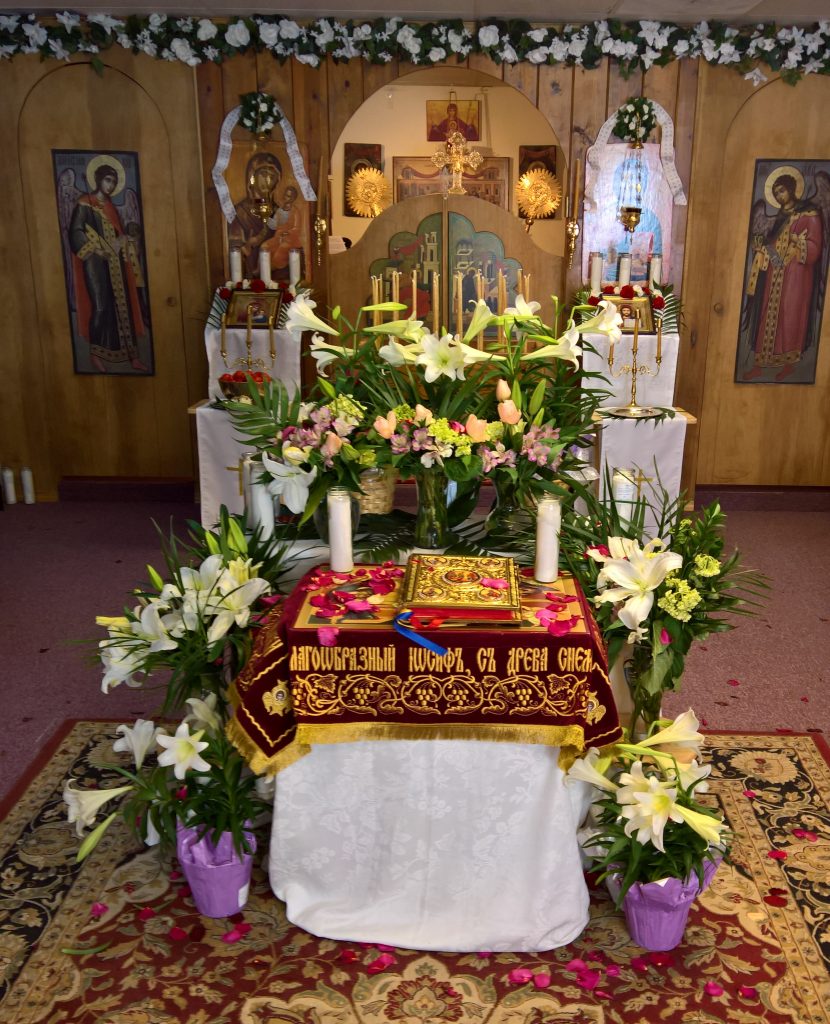This little article was written by a pious priest, who has since reposed. It is not about what you already know about blessing homes – get a candle, get some holy water if you have it, get an icon, write out a list of all the living you want the priest to pray for, write out a list of the departed too, turn off the television and radio and other electronic devices… you know all that, or should. This is instead a message about the deeper meaning of this, deeper preparation, deeper cognizance of the whole event – a serious application of the blessing to our lives.
The tradition of blessing homes is of special beauty and significance. It is not simply a sentimental custom without meaning, nor is it a custom whose meaning we have forgotten. This tradition was usually attached to a special event in our parish – the parish nameday or some other holy celebration. In some cases*, it was done at the time of the feast of the Lord’s Baptism – reminding us of not only our baptisms, but also of the need of baptizing the world in which we live, including what we might call “my world” – ‘my personal space.’
When an Orthodox Christian believer moves into a new home, he dedicates it not only as the abode of a follower of Christ, but also as a shining example to the community of good clean Christian life. He asks that God, the source of all goodness and the Giver of every perfect gift, bless his house and all that is within it; he recalls that Jesus Christ, His Son, came to bring Salvation to it, even as He brought Salvation to the house of Zacchaeus, the house of Mary and Martha and Lazarus, and the house of Saint John the Evangelist when He sent his holy Mother to live with him; he prays that the Holy Spirit may abide in it, guiding those who dwell in it in the Paths of righteousness. And he brings into his home holy icons of the Savior and his Mother, and of the saints and of holy events. He brings candles and incense blessed in church. This blessing at the establishment of a house is usually celebrated by the priest in the presence of the entire family, or by the head of the household if the priest is unavailable.
On the Feast of the Parish or the Feast of Theophany we rededicate our home for its original purpose, just as we must periodically rededicate our life to Christ. We do it especially on this Feast because this is the day on which we remember in the Church Year the coming of Christ who began His Ministry when He descended into Jordan to be Baptized by Saint John the Forerunner and Baptist. He enters again into our lives reminding us that we must “repent, for the Kingdom of God is at hand.”
An Orthodox Christian must dedicate not only himself and his house to the Lord, but his daily work and all his efforts as well. All things are to be done to the glory of God. That is why in the Christian Orthodox Church, not only religious objects, such as icons, crosses, churches and vestments, are blessed, but also homes, fields, animals, clothing and all objects which are used in our daily lives for the good of man. In this the Church expresses its faith that the Holy Spirit’s sanctifying action extends over the whole Creation.
At the Nativity of Our Lord, we sing a carol which tells us ‘Let every heart prepare Him room.’ We know that this means not only to ‘make a space for’ but it means to clean and cleanse and purify our homes and get ready for Him to come to us, not only in our homes but also, and more especially, into our hearts.
We prepare our hearts and souls and heads, cleaning them of all sinfulness so that when He comes, the place will be refreshed and ready. When someone comes to stay in your guest room (which you may not use often, or may use only to store lots of ‘stuff’), we normally air the room out, dust it and change the bed linens which may have become somewhat musty. We might even wash the windows to let the light shine in, clean the floor, and make room by shoving all the ‘stuff’ into closets (or under the bed). We know then that cleaning the house of our soul is equally hard work – we take stock of our lives and actions over the past year, come to confession so that Our Lord – who washes away our sins when we confess them – when He comes in to us, has a refreshed and clean place worthy of laying His head – He comes to abide in us as well as our homes!
But we need to think a little farther and deeper. We need to look carefully at our houses, our homes, the places where we live and work.
‘Prepare Him room’ means also to fix and repair everything that is broken in the house. This is because the blessings of our homes are the re-dedication of our family and household to the Lord. Parents recognize (or ought to recognize) that all they have and all that they will ever have comes from the Lord, and they pass this along to their children, when they go through the house cleaning prior to its blessing.
Blessing the home is a spiritual ‘exercise’ led by the Lord Himself, usually through his priest or sometimes by the head of the family and in the presence of the members of the assembled family, dressed in ‘good clothes,’ and maybe even invited guests, friends and kinfolk, who all enter into worship and thanksgiving with us. Effective family life does not just happen; it is the result of deliberate intention, determination and practice.
Before the home is blessed, the house must be cleansed of all that is an affront to God, all that is offensive to Him. Just as we prepare our souls, we have to prepare not just the building, but the spirit in which we live. This should be done as a family. We should ask each other if there is anything which is causing us to hold a grudge or to refuse to speak with someone. We need to examine all the excuses we have to ‘lock ourselves into our rooms’ in order to have ‘privacy’ or to do shameful things.
We need to collect together and remove all those things in the house which are offensive to God. None of these items should be given away to provide others with a cause for sin. If at all possible they should be destroyed through recycling which is certainly a useful and proper habit.
When Israel was preparing to enter the promised land, the people were told, “The graven images of their gods shall ye burn with fire: thou shalt not desire the silver or gold that is on them, nor take it unto thee, lest thou be snared therein: for it is an abomination to the LORD thy God. Neither shalt thou bring an abomination into thine house, lest thou be a cursed thing like it: but thou shalt utterly detest it, and thou shalt utterly abhor it; for it is a cursed thing.” Deuteronomy 7:25, 26.
Our Lord commands us not to have idols: remove every item that has any association with idolatry. This includes vain and sensuous images, improper and alluring, seductive clothing, objects like talismans, charms, books, literature, and objects that solicit fear or demand reverence of anything besides the true and living God.
Have you been abroad? Did you bring back statues of Kali – the Indian goddess who has many arms? Did you find a beautiful contemplative Japanese Buddha? How about a Chinese Kwan Yin (who resembles the Virgin Mary holding baby Jesus)? How about some primitive African idols? While some may say these are merely ‘art objects,’ Christians recognize these as idols and know that they have no places in Christian homes.
All games dealing with the occult, and with forces of darkness must be removed, including “Ouija boards” and “tarot” cards. There are many TV and computer games along these lines that must be included in this cleaning, along with all pornographic books, novels, magazines, videos, discs and recordings. What society calls pornography (depictions of immoral sexual acts in literature or on recorded media) is not the same as God’s definition of it.
Saint John the Evangelist writes in his letter: “Love not the world, neither the things that are in the world. If any man love the world, the love of the Father is not in him. For all that is in the world, the lust of the flesh, and the lust of the eyes, and the pride of life, is not of the Father, but is of the world. And the world passes away, and the lust thereof: but he that does the will of God abides for ever.” 1 John 2:15-17.
We must remember that we can idolize ourselves. Cosmetics and ‘fashionable’ clothing are designed to seduce others, but they also seduce us by means of pride and vanity. They exceed ‘self respect’ and normal adornment with modesty and propriety, and play only to a false ‘self-image.’
Our bodies are the home of the Holy Spirit so we must never harm our bodies but keep them pure and undefiled. The use of ‘recreational’ drugs that are potentially harmful is forbidden to Christians. This includes hard alcohol and tobacco. In the house cleansing tobacco products, marijuana, and all illegal drugs must be destroyed and their use discontinued. Medicinal drugs are for the benefit of man and are not offensive to God unless we become addicted to them. If you feel that you might be addicted to a medication, speak with your physician about an alternate treatment, We must remember that we the temple of the Holy Spirit and we must not do anything to harm or desecrate our body.
Get rid of all books and materials that advocate heresy, error, useless speculation or which provide confusion to the mind. There are many good books which present the truth about Christian life. We do not need materials about false philosophies in our homes. Books and materials advocating false religious teachings should be eliminated. A mature Christian who is able to use these materials to work for the conversion of those following false teaching may have a reason to own some of these materials. But most Christians should not have the books and materials published by cults, magicians or others who are not true to the Holy Scriptures.
Sometimes a family member will have a stash of pornography or liquor or drugs that is unknown to the other members of the family. In such cases the family member should confess his sins, ask forgiveness from his family and from God and add all of these hidden materials to the pile of things being ‘cleaned up.’
All of the above “things” are physical symbols of spiritual poisons which pollute our lives and the lives of our family. How can we live with these venomous things surrounding us? Just as arguments, disagreements, fights, physical and verbal abuse, poison the atmosphere, so does all this filth – this pornea – pollute our homes.
Do you think I’ve over-stated my case? I think that a “Christian life-style” is required for all Christians. Tolerating immorality, indecency, idolatry, immodesty, dirtiness is an affront to God and is NOT part of a Christian life-style. Such a non-Christian life-style should not be blessed or tolerated.
in some cases’ – In this country it has become the norm to bless houses at Epiphany (or Theophany). The older custom, connecting the blessing of homes with the parish feast day.
![]()


